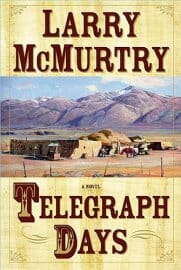
Cowboy cliches? McMurtry heads ’em up, moves ’em out
Larry McMurtry has much to tell us about the cognitive dissonance between the enduring Western myths and the messier, uglier truths about the taming of the frontier. But as much as he’d like to set the record straight, he’s too enamored of these myths to resist playing around with them—even reveling in them. That’s what separates the Pulitzer Prize-winning author of Lonesome Dove—his dense Dickensian masterpiece about machismo on the plains—from a dreary demythologizer like Deadwood creator David Milch, who foregrounds the existential dread of the West but leaches out the sense of adventure.
McMurtry is a ripping storyteller; he just tells a few too many. Telegraph Days is his 44th book in 45 years, and we can’t leave out all those screenplays, essays and reviews. He’s become a national treasure, our Scheherazade of the West, but every once in a while he’ll cough up something like Telegraph Days, a genre exercise that revisits many of the themes McMurtry has explored elsewhere with far greater depth and nuance.
Telegraph Days’ protagonist is Marie Antoinette “Nellie” Courtright, a 22-year old true-grit gal that has become something of a McMurtry stock character. The story, which Nellie narrates herself, takes place in the years immediately following the end of the Civil War. Nellie and her brother Jackson are the two surviving members of the Courtright clan, which has been decimated by a brutal Western migration that felled their mother and six siblings. The story begins with the suicide of patriarch Perceval Courtright, who hangs himself from the rafters of his barn. Faced with an uncertain future on their father’s failed plantation, which is somewhere south of the Cimarron River in the Midwest plains, Nellie and Jackson travel by mule to a Nowheresville town called Rita Blanca, “A dusty place…where people stopped when they just absolutely didn’t have the strength to travel another stop toward Santa Fe or wherever they thought they wanted to get to.”
Rita Blanca is a godforsaken place, of course, where Beau Wheless, the town carpenter, can’t hammer the coffins fast enough to keep pace with the carnage. But Nellie and Jackson ?nd their way here. Sheriff Ted Bunsen, who has designs on Nellie, makes Jackson deputy sheriff, while Nellie—an aspiring journalist—mans the telegraph machine and becomes the town’s portal for civilization.
McMurtry wants the book to be a rollicking picaresque, and in the past (Cadillac Jack, for one) he’s pulled off this kind of revved-up narrative with aplomb. There’s no denying the story’s forward thrust; few writers can leave out particulars like character development and just plow forward without sacrificing something essential like McMurtry can.
But Telegraph Days is not so much Lonesome Dove as it is Forrest Gump with spurs. It seems as if every Western icon shows up at some point to make a cameo. First, it’s Bill Cody, who takes Nellie under his wing in his attempt to turn Rita Blanca into a template for a Western theme park. Then, The Earps show up to make trouble in the town. And look, folks, it’s none other than Jessie James who—in a superfluous and mildly amusing set piece—tries to rob a valuable piece of jewelry from Nellie.
McMurtry’s objective isn’t too hard to fathom: he wants us to understand how enterprising folk like Bill Cody and Nellie Courtright (who becomes a bestselling memoirist and novelist by book’s end) gussied up the facts and sold the enduring legend of the West. At one point Bill Cody tells Nellie of his scheme to hire the Indian enemy for fun and profit. “Right now they’re fighting and getting killed,” he says, “but once I get my Wild West up and running all they’ll have to do is pretend to fight. We’ll do a fake attack on a settler’s cabin, or the Deadwood stage, and instead of getting killed for their trouble they can be paid cash money.”
Even so, Telegraph Days seems muddled by warring impulses. Maybe you can’t debunk myths when you’re working with clichés. “I had pretty well convinced myself,” writes Nellie/McMurtry, “that this Buffalo Bill Cody was probably somebody who needed to be put in his place. But then up Bill Cody trotted on a fine gray horse, beautifully dressed, handsome as a god, friendly as a collie, and all my tough resolves turned into toffee.” Friendly as a collie? Now that just ain’t right.
It’s hard to fathom that this is the same writer who took home an Oscar for his adaptation of Annie Proulx’s Brokeback Mountain. That film exploded every Hollywood cowboy trope and gave us something we’ve never seen before in a Western. Telegraph Days spoonfeeds us all the Western motifs and characters we know all too well.